Thinking About A Second Child? What the Research (and Other Dads) Say
Delving into the rational and emotional arguments for one child versus two.
Now that the book is done—US readers can pre-order on Amazon or Bookshop.org, you’re going to get sick of me saying that between now and May 12th, 2026—I’ve been asked by a few friends, “Will you write another?”
To which my reply has been, “Who in their right mind would willingly put themselves through that again?” Which is similar to what you think to yourself when a well-meaning relative asks, “So, when is baby number two coming?” whilst you’re still learning how to change your baby with one hand whilst attempting to get a dirty onesie into the dirty laundry basket without covering your fingers in excrement.
The decision to have a second kid isn’t one you take lightly. In the years since I first published the essay below, it has become one of the top Google results related to questions like “Should I have a second kid” or “One child versus two children.” Thought it was a good time to bring it back—if you were already reading back in 2022 with a newborn, you may have skimmed over it, mentally bookmarking it for another day. Or you may be new here and navigating these same thoughts right now.
A final note: This essay touches on the decision to have a second child. But if only it were as easy as simply making a choice. It’s the first step on a long journey: some parents reading this may have wanted a second child, but decided against it due to health or financial reasons; others may currently be trying, but for various factors, it hasn’t happened yet. Thinking of any and all of you, and feel free to skip this one if you need to. — Kevin
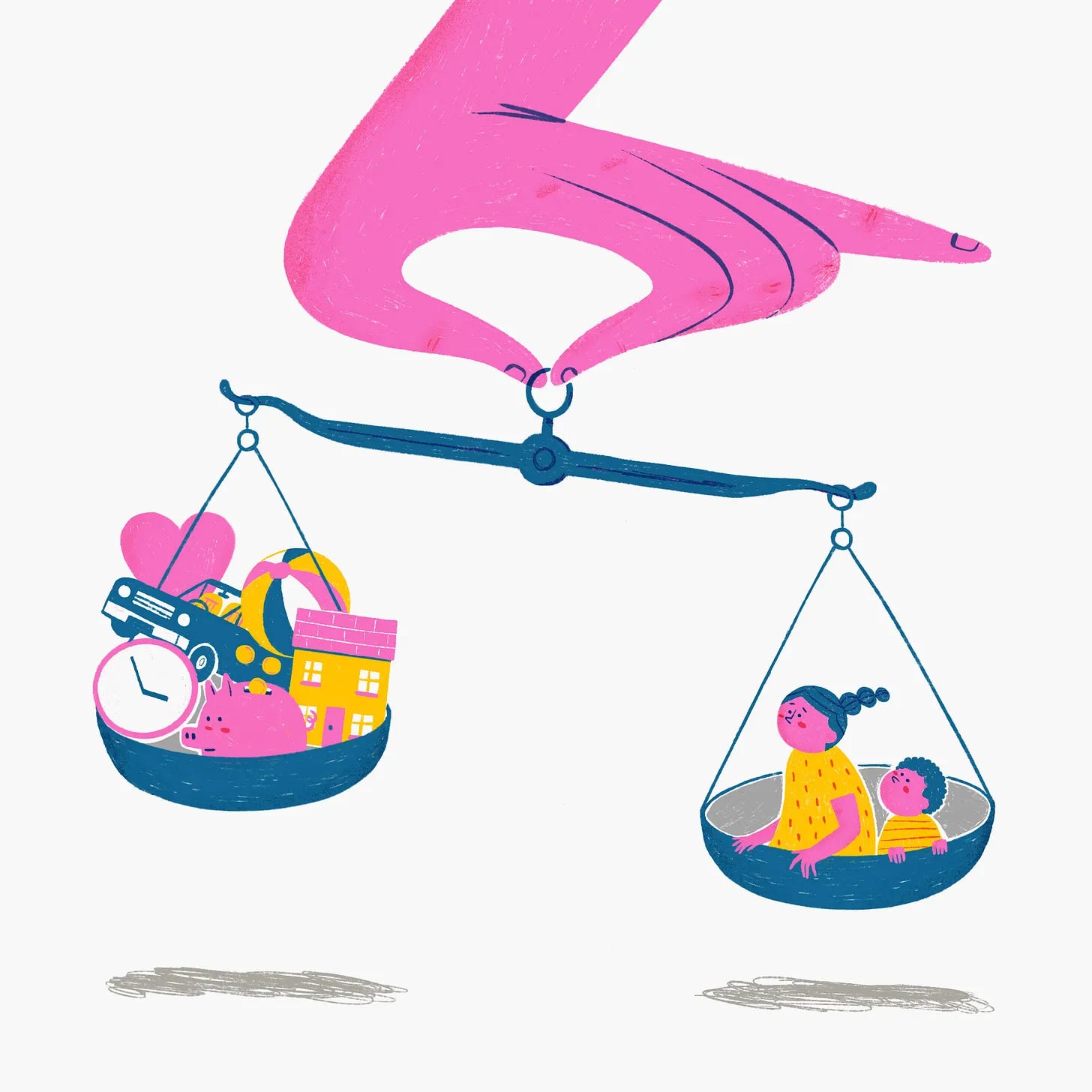
Any couple heading towards marriage—and many others who aren’t—will discover that people love gettin’ up in ya damn business. “When are you going to have kids?” they’ll enquire, going straight for the jugular. Maybe they won’t be so direct, taking the scenic route instead: “You two will make such cute babies,” they’ll wistfully imagine, leaving a pregnant pause—pun absolutely intended—and wait for a response. Woe betide you if they know you’re trying already, as those questions become increasingly more awkward: wondering on bedroom shenanigans—how long? how often?—and what you’ll do if it doesn’t work out.
There’s another avalanche of questions (and judgments) for couples who decide not to have kids. And what about those who have tried, but it hasn’t worked out? With hundreds of reasons why a couple might end up childless—many of them leaving parents in ongoing anguish, and being the absolute last thing they want to talk about, stood waiting at the bar, in the middle of Dave’s 40th birthday party.
Some interrogated parents will end up having a child, and foolishly believe the inquisition will end there. But it’s only getting started. “So … when are you going to start trying for number two?” they’ll ask you both, a barely born baby hanging onto a nipple for dear life, your partner’s body only beginning to get over the herculean1effort of spending 9 months turning food into a baby, and then almost single-handedly—with the help of medical professionals, but she will do almost all of the work—bringing said baby into the world. “Are you just going to have one?” they’ll enquire at your child’s second birthday, examining your face for any hint of a clue, the meaning of “just” implicit: something is clearly missing from this family of three, and how dare you cruelly withhold a sibling from this clearly deprived child.
In many ways, the decision for a second is bigger than the first. Many couples discuss the number of children they want in the early years. But the realities of raising a child may make you question the decision you aligned on earlier. You’re returning to Mount Doom with open eyes, knowing exactly what it takes to overcome its challenges. But whilst one child changes your life significantly at the overall trajectory level, a second child transforms things on a daily basis.
You think one kid is hard? You know nothing. Two kids is beyond what you could imagine. It’s relentless. You need to switch from zonal defence to man-on-man. The logic behind the entire universe somehow stops making sense, and 1+1=5. You feel outnumbered, even though it’s 2 vs. 2. There’s always something to deal with. You finally manage to get the little one down for a nap, and you realise that constant hair scratching from the eldest is nits. You finally seem to get a second child onto a regular sleep pattern, and the dreaded sleep regression hits with the first. Or you manage to get them to play nicely together, leave the room for 30 seconds, and they’re somehow screaming and at each other’s throats.
You think the second will be easier. How can it not? But the transferable skills are limited, and the insights you uncovered the first time around are lost in the dark recesses of your brain, occasionally reappearing at the moments you least expect; echoes from the past, repeating themselves, a scratched record clicking back into an old groove.
All new parents of a second child will share that quintessential sibling photo: the eldest child holding the baby carefully, both of them blissfully unaware of the drama that will soon unfold. The dream of two kids is that they’ll play nicely together and love one another forever. The reality is dramatically different, at least for those initial years. The jealousy gets real, real fast, and the street runs both ways. The eldest has to learn how to live as second in command, and when your little bundle of joy and turd gets a bit older, the ever-changing dynamics are ground zero for a constant battle of wills.
Then, after a while, something starts to click. They start playing nicely together. Looking out for each other. The eldest will perform a random act of kindness that will fill you with pride—surely you did something right raising them? You start to see what one friend sobbingly referred to as “the joy of seeing two people—half me, half my partner—showing love to each other.”
A few years back, I was putting my two to bed. My son didn’t want to go into his cot, instead asking to lie on the top bunk with his sister. So they lay there together for a while, snuggled up like a pair of fox cubs in their den, while I read them a few books. There was a warmth, like the promise of siblings was finally coming to fruition. And they woke up the next morning and resumed the bickering.
A second child provides an experience to revisit your greatest hits of fatherhood. I remember pulling the classic “stealthily fast-forward the current TV episode to the end, and tell them we are turning it off after this one” trick with my son when he was three. My eldest saw me do it, and looked across, giving me what I can only describe as Jim Halpert Face style, incredulous—how dare I!—before I told her it had worked on her until she was at five. And if she wanted to stay up a little longer this evening, and maybe watch something herself, she should learn to KEEP HER DAMN MOUTH SHUT.
Another baby? In this economy?
When you’re deep in the debate on baby number two, there’s a mountain of interlocking aspects to consider. There’s obviously the cost: although a second child is less expensive than the first (due to the sunk costs on housing, transportation, baby things, and discounts in childcare and schooling), there’s still a serious financial impact. According to 2015 data from the USDA, American parents can expect to pay around $12,980 annually to feed, clothe and house each child they have. And a potential recession, increasing inflation and rising costs of living are leading many families to shelve their desire for a second. Your current setup might need to change—upsizing to a bigger house; the slow, inexorable march towards minivan ownership—which will come with a weighty impact on whatever is left in the bank. Your experience with your first will play heavily in your decision: if there were problems conceiving, during the birth, or complications afterwards, there will be an understandable reluctance to go through it again. For those going down the traditional conception route, the health of the mother will be a point of discussion, as will her willingness to give up her body to a small human for at least another year, if not more. There’s also the biological clock question—more pressing for women than men, clearly—that delivers an extra level of pressure, because “if we don’t do it now, we might miss the chance forever.”
You might find yourself wondering how your first child will feel about it—an issue that becomes increasingly complex as the age gap between potential siblings grows. And roll into all of this the pressure from family, friends, and society—I recall when we were contemplating this ourselves, it seemed our friends with two weren’t suggesting it for our own benefit, but rather were eager that we come join them in their collective misery. (When male and female friends with more than one kid heard I was writing this essay, the most common answer was to laugh and jokingly say, “Don’t do it!”) Proximity to family will also factor heavily—if doing it without easy access to help is tough with one, then doing the same with two is akin to finishing Dark Souls with a Guitar Hero controller. We’re only scratching the surface here, with dozens more factors that play a role—studies have shown that even changes in car seat laws can impact whether a family decides to have more children.
It’s not a decision to be taken lightly. Surely the reams of research out there that can help us make this decision? Oh, foolish reader, if only it were that simple. The findings are as inconsistent as whatever your child will eat for dinner this week.
Multiple studies have found that having even one child will reduce your quality of life but increase your sense of meaning. That much seems locked in. One study from 2005 found that having a second child had a negative effect on the well-being of mothers, but no effect on fathers. However, I’d wager that the changes in fatherhood norms over the preceding two decades would show a more significant impact on men if the same study were conducted today. A fascinating 2016 study confirms this hunch, placing participants into three family models: Traditional, where the parents endorse a male-breadwinner model; Modern, with a dual-earning system and a more equal division of responsibilities between genders; and Mixed, which comprises the majority of the population. This study again found that a second child has little positive impact on life satisfaction for mums, but a significant gain in life satisfaction for dads—although dads in the Modern family models don’t see as large an increase as those in the Traditional setups, due to the increased workload they share with the mother.
And the effect on the parents? Studies have shown that even one child reduces “marital satisfaction” and there is “a significant negative correlation between marital satisfaction and number of children”—a hit that only begins to recover once the children leave home. Dan Gilbert, Harvard professor and happiness expert, once said, “The only symptom of empty nest syndrome is nonstop smiling.” A rare pan-European study from 2014 found that having a second child increases the level of happiness for both parents, while having a third child causes it to decline. More children “will significantly increase the level of stress that parents face,” was the conclusion of this study from 1970, to which any parent reading this with more than one child will reply, “Well, duh.” And recent data reconfirm this, with additional insight that the majority of the stress is borne by the mother, to which any woman reading (with or without children) will reply, “Well, duh,” once again.
What about the happiness of the children themselves? The results are (once again) all over the place: whilst one UK-based study clearly states that the fewer siblings children have, the happier they are—and only children are the happiest, another piece of research found that having a sibling increases child happiness—especially if the sibling is a sister. A Swedish study found that satisfaction with sibling relationships was a key driver of health and happiness in later life—more so than friendships or adult children.
And if you decide to have more, where should you draw the line? My dad is one of fourteen, so I’d suggest significantly before then, perhaps? (Good old Irish Catholics.) When it comes to society’s overall attitude to larger families, the times they are a’changing. In 1976, 40% of women aged 40 and older in the US had four or more children. Today, that number has dropped to 15%. The giant family is becoming a thing of the past. However, the stigma of being an “only child” still runs deep—a 2015 Gallup survey found that 48% of Americans believe two is the ideal number of children in a family, with only 3% opting for one.
I’ve always believed that too many children means however many you have + 1. Families with one child see friends with two and wonder how they do it. Families with two kids say, “It’s tough, but at least we don’t have three”. Families with three kids look strangely at a family with four trying to squeeze into a car like they’re auditioning for the circus. Bryan Caplan, author of Selfish Reasons to Have More Kids said the optimum number of kids is four, which is conveniently how many he has. I’d say the optimum number is two, although during the COVID-19 pandemic, I might have suggested a number closer to zero. For those who opt for more, there seems to be a moment where things get easier, if only mentally. Dr Janet Taylor, a psychiatrist in New York, with four kids herself, once said, “There’s just not enough space in your head for perfectionism when you get to four or more kids. It’s just about survival”
The research is inconsistent at best, and outright contradictory at worst. But whilst there’s precedent for stopping at one—Speed 2: Cruise Control and Teen Wolf Too spring to mind—sometimes the second can be even better. Deciding to go for another gave the world The Empire Strikes Back, The Dark Knight and The Bends. And where would we be if Mr and Mrs Hemsworth decided to stop having kids after just one?! Thor-less and sad. That’s where.
We spent a long time debating our second. We did what everyone seems to do—made a list of pros and cons, thought long and hard about the impact another child would have on our lives, and considered if we were ready to do it all again. In the end, the thing that clinched it for me was a simple insight: every reason to not do it felt selfish—having to do another round of sleepless nights, thousands more nappies, forgoing spare time to spend on my own hobbies; whilst the reasons to do it felt if not altruistic, then something close—a sibling for my daughter, someone she could grow up with. “The first one is for you; the second one is for them,” a close friend shared, just as I was putting the finishing touches on this essay. We talked about how siblings support each other—yesterday, today, and tomorrow. One of the biggest learnings from the last 18 months of my life is how important siblings are when you lose a parent. If life goes according to plan, and your parents die before you do, who better to help you carry the weight and work through the grief than someone who knew them just as well as you?
Having another kid is a huge decision. And it’s one that only you and your partner can make. My wife and I constantly looped back to the vast unknowns of having a second. Would we be able to get pregnant again, and would everything go OK with the birth? And beyond that, what would the second baby be like? We were very lucky with our first conception and birth, roughly according to plan; a happy, relatively chilled baby, with no major medical issues along the way. If we were to roll the dice again, what might happen? And would we be ready for it?
A second child is hard work, and the impact it will have on your life is momentous—dealing with the fallout of my second broke me, but I’m happier than ever with the person that I put back together. Nothing, especially not a 3,000-word essay in a weekly newsletter, will prepare you for the trials a second will throw at you. But through it all, I haven’t regretted it for a moment. My son is one of the funniest human beings I have ever met, and he brings unbridled joy to our lives (almost) every day.
Over to you …
Back in 2022, I was you: “How many kids do you have, and how many would you like?” Thank you for these insights and nuggets of wisdom that may help others in a deep decision-making mode.
Always a difficult subject for me, although I don’t know of many couples that survived a second kid. Hope you have a little word about us who wanted a few more (even just one more) but for various reasons (in my case: wife’s health and her lack of interest) had to give up on that idea. Foster or adoption are possible avenues to explore in some cases. Paul
Two for us. We both grew up as the odd one out of three (I have two sisters, my has two brothers) and while we’re close with our siblings, we’re not close like our friends with one sibling are. When I was younger I wanted three but actually parenting put paid to that. Matthew
As one of 3, my relationship with my older brother has been such a rollercoaster—at times dangerous and traumatic—that I automatically felt I’d never want to inflict a lifelong relationship on our daughter that wasn’t her parents. My wife is an only child, as are my parents… so I don’t think they are the sociopaths that society makes them seem. And my wife has had to witness her mother and auntie at their throats for 30 years. I don’t think another child is either affordable or more importantly desirable for us, but I’d love to move past the negative association I have about raising siblings … so really keen to hear from parents with 2+ kids who may have worked through similar issues. Ivor
Two and done (barring any surprises). We went into parenthood thinking 3–5 was the size we wanted as we both come from large(r) families. We joked we wanted enough kids so people don’t invite us places. But #2 came along with some health difficulties in her first year+. Also, somewhat surprisingly, my wife isn’t a fan of 37 weeks of nausea. Then COVID killed it for good, and more is no more. Andrew
We have two, and had always planned for four (I’d be happy with more, as a youngest of 7 myself, but 5 is a stretch for my wife). However, my wife got a diagnosis that means it’s dangerous for her to get pregnant, so we’re done making kids ourselves. We did get a minivan when #2 was on the way, so we’re hoping to foster/adopt some kids at some point to fill it up. Kids are the best, and I’m not intimidated by having more kids than parents - sounds like a blast! Michael
Have: two; want: one. I kid, I kid (pun intended)! Two feels like the perfect number for us, otherwise we’re playing zone/prevent defense and that never works out. We will never get a minivan, but we do have the equivalent for two kids: a “gently used” Subaru Outback. My wife, who doesn’t have a license, calls it “a safe, reliable family car” so I’ll take it. Jeremy
We’ve presently got just the one, but are eager to justify trying for a second. We don’t feel ‘settled’ enough as adults to justify having another; financial stability, life direction, etc. And haven’t done since we had our first almost nine years back.
But we both have valued our relationships to our siblings enough that we’d like to give our first someone else to have in their life decades from now. That said, the age gap would be effectively a decade, so there’s some concern about what their relationship would look like at various stages of life. Then there’s also the notion of doing the first ten years of parenting over again, when we’re both a decade older. JD
My wife put her foot down after one, which seemed sad at the time, but now I am deeply thankful for it. One seems perfect. Rick
We had five for the last nine months or so, but two just reunified with their biological family last weekend (always bittersweet). So we’re back down to three and definitely going to take a break for a little. It has been harder than I could have even imagined. So, right now everything is way future, but we’ve talked about one more biological kid and maybe reopening for foster care after our oldest graduates. Troy
Have: two; want: one. I kid I kid (pun intended)! Two feels like the perfect number for us, otherwise we’re playing zone/prevent defense and that never works out. We will never get a minivan, but we do have the equivalent for two kids: a “gently used” Subaru Outback. My wife, who doesn’t have a license, calls it “a safe, reliable family car” so I’ll take it. Jeremy
Three and at first it felt like we were non-swimmers who found themselves in the deepest part of the Ocean. With kids , I think 2+1 makes 10 really. Now we feel much better , it’s much better now she’s older and pure joy to watch with her siblings. Happy and hopeful they will be there for each other as I and my siblings. Lise
Just the one for us; and he came after a number of years of trying naturally before having to turn to IVF, mid-pandemic. The twists didn’t end there, he arrived 9 weeks premature and had to spend 4 weeks in the intensive care unit at the hospital. We’ve gone back and forth on the idea of having a second, but after the events with our first, it’s a daunting proposition. Dave
I went from one to three with the birth of twins (now 16 months old). My sister has four. We discussed the step changes in difficulty, and decided that it’s a power law.
One child, difficulty level 1. Great job, you’re a parent!
Two children, difficulty level 4. You’ve levelled up, but things just got a lot harder!
Three children, difficulty level 9.
Four children, difficulty 16 (hard mode!)
Five children, difficulty 25; too many, get help!! Joseph
We have one, Violet, and that will be it. Sometimes it makes me so sad; when we are reading at bedtime, I tell her the other children in the books are cousins; I am not ready for her to ask and have to explain she won’t have brothers and sisters. I had four, and looking back, it was brilliant (if crowded). But it has been too hard: older parents, miscarriages, traumatic birth, pandemic and postnatal depression for 2 years, which means neither of us wants to have a second, we are just too bruised. Anyway, Violet has loads of cousins, which will have to be enough. It did make me almost cry when the clinic wrote to ask what we wanted them to do with the other embryo. I ignored the letter and hope I can deal with it next year (not very grown-up). Chris
4 things to read about second kids and siblings
“What Number of Kids Makes Parents Happiest?” by Joe Pinsker in The Atlantic [Gift Link]. In this essay, Pinsker talks to a variety of authors and experts (some of whom are included above) about how many kids are the right amount. “What’s optimal, then, depends on age, life stage, and family makeup—in other words, things that are subject to change. While being the parent of a young child may not seem to maximize happiness, parenthood may be more enjoyable years down the line.”
“What If I Just Don’t Want To Have A Second Baby Anymore?” by Carlo Ciccone in Romper. A look at things from mum’s point of view, 18 months into the pandemic, as Ciccone wonders if “stay-at-home orders, winter blues, isolation, languishing, depression, anxiety, a recent ADHD diagnosis, and having very little time or energy” have left her feeling “Fundamentally changed. I love my little family of three and I might not want to add to it.”
“Working Mums Reveal Their Struggles Over Having A Second Kid” by Elizabeth Segran in Fast Company. Returning to work has long played a role in the decision for women to have (or not have) a second child. But with modern fatherhood meaning more stay-at-home fathers and equal co-parents, we’re likely to see some of these themes reflected in a male audience too. “I ask myself how this is going to affect my life, my marriage, my son […] You need to think of it a little selfishly too, because you don’t want any resentment creeping in on you later on. That’s not fair to your child, either.”
“Only Children Are Not Doomed” by Emily Oster in The New York Times [Gift Link]. Emily Oster, founder of ParentData and a Time 100 recipient, debunks some myths surrounding only children. “It would seem that siblings do not have a large impact on most characteristics we can measure. In the end, neither the deprived younger sibling idea nor the awkward only child one hold much water. Parents argue about these ideas across the internet, saying that having or lacking siblings is key to making your child the best they can be. The evidence disagrees. Your decision about how many children to have should be just that: your decision about what works best for your family.”
Good Dadvice
Say Hello
This is another regular update from The New Fatherhood, your parenting public service broadcaster. If this essay played a significant role in deinfluencing you from having another baby, please consider allocating a portion of the $12,980 you will now save every year to an annual subscription.
Did you like this week’s issue? Your feedback helps me make this great.
Loved | Great | OK | Meh | Bad
Branding by Selman Design. Illustration by Tony Johnson; this is one of my all-time favourites, and I'm delighted to put it in your inboxes again.



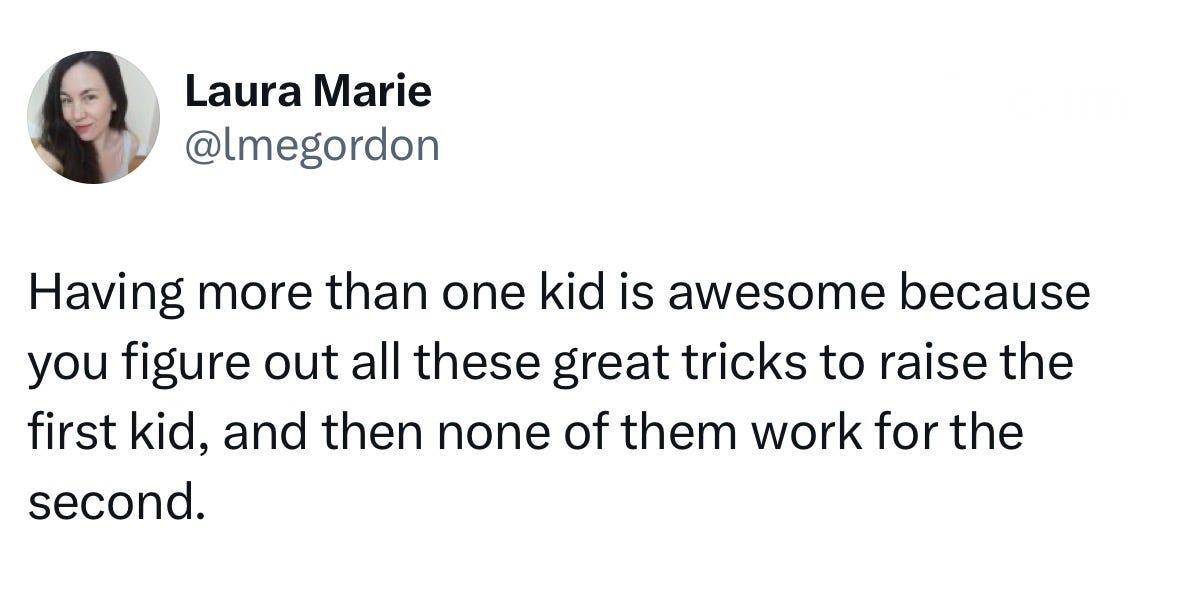
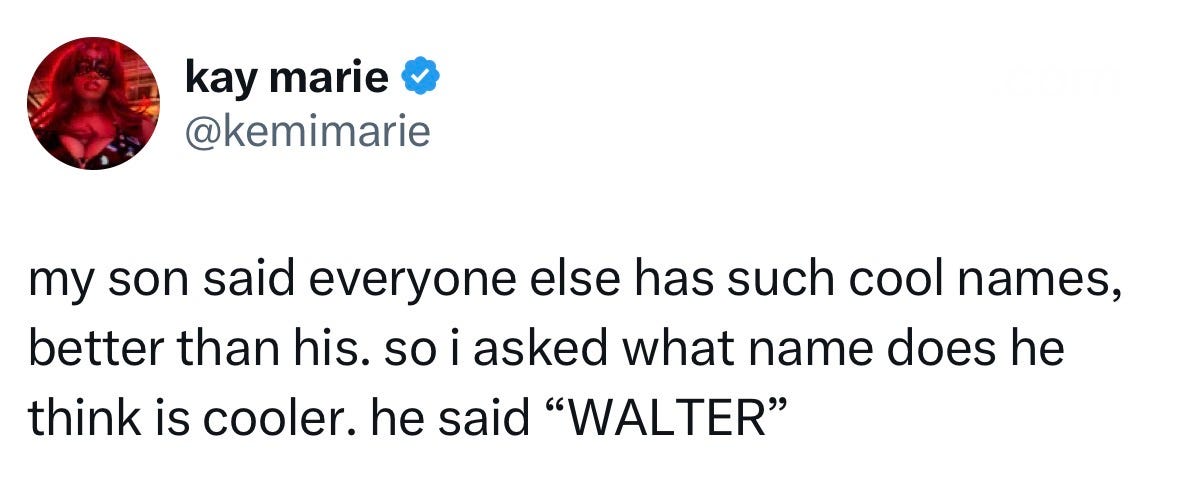
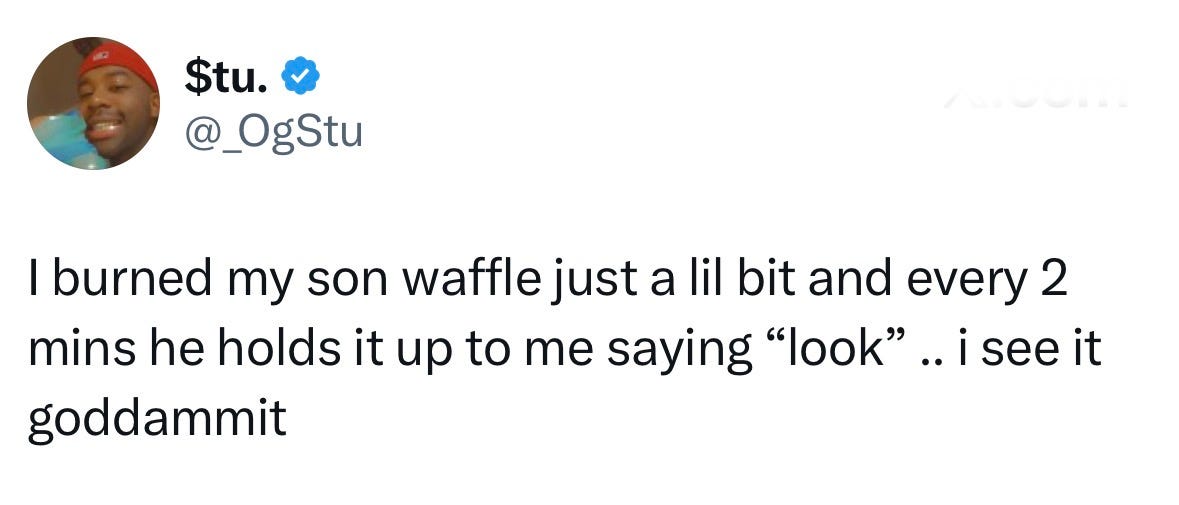
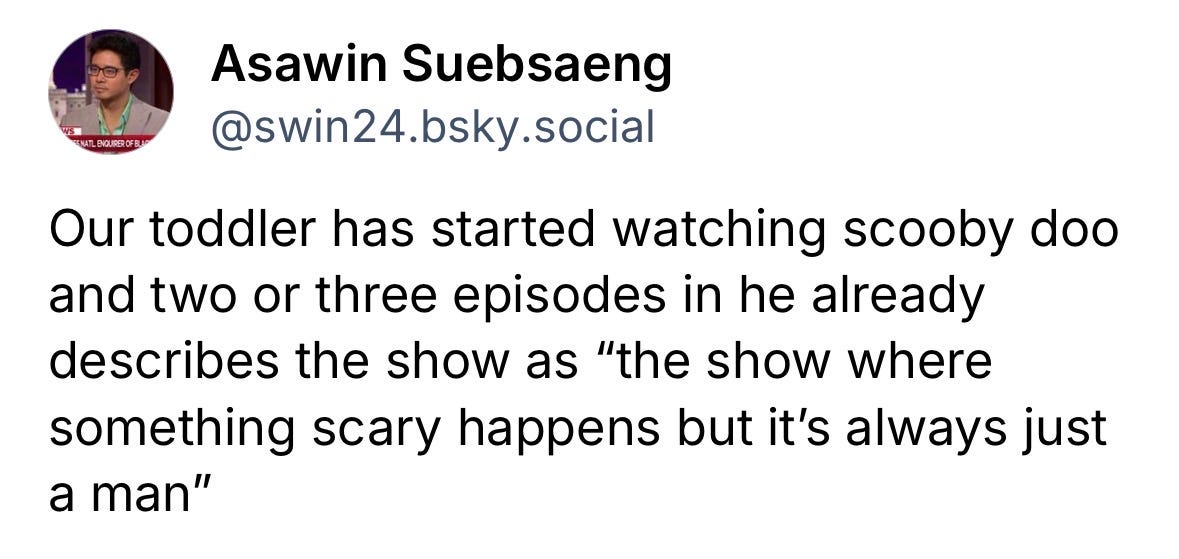
I just got my second son 5 months ago and it has been absolutely great. It is almost a healing experience to father another child, but this time I feel confident and I know what I am doing.
Actually we are so stoked that just a few weeks into the project, we shook hands on getting a third one in a few years.
I can definitely recommend trying two times to get to do it once with competence.
My 3.5 year old and 1.5 year old entertain each other 30% of the time. Economies of scale. I'm pretty sure once we hit 6 they will raise themselves.